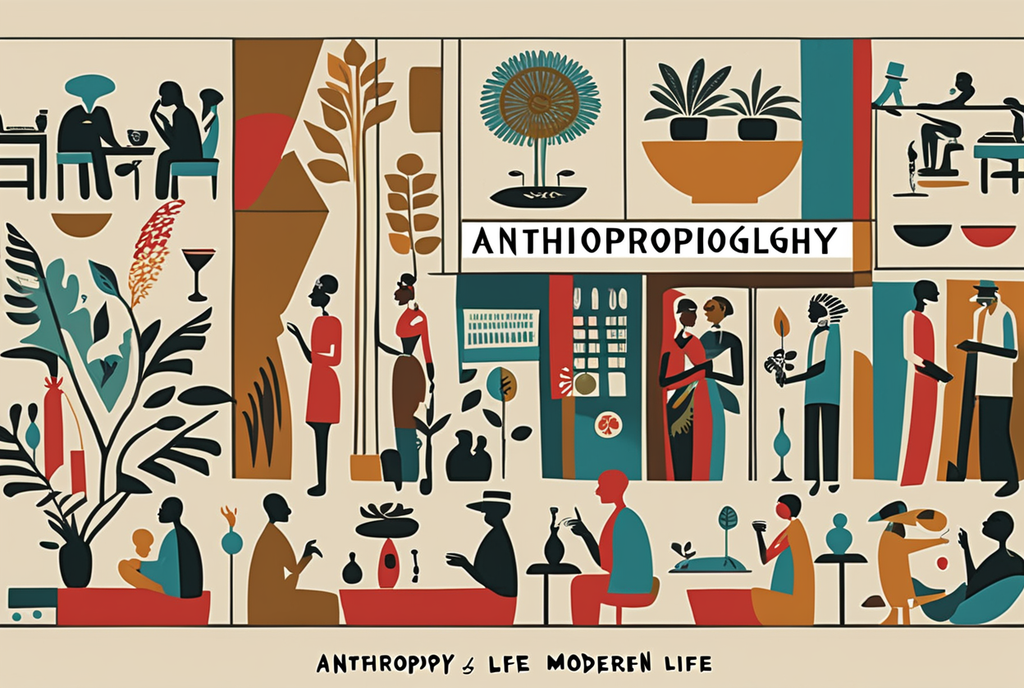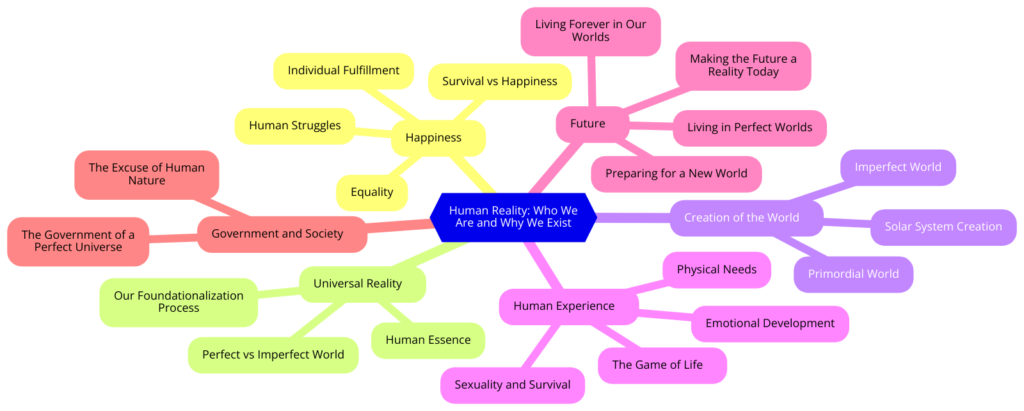Anthropology, in simple terms, is the study of people. It’s like being a detective who tries to understand and explain everything about humans – our history, cultures, behaviors, and how we’ve evolved over time. Anthropologists explore how different societies work, what they believe, how they communicate, and why they do the things they do. They do this by observing, talking to people, and digging into the past through things like ancient artifacts and fossils. Essentially, anthropology helps us better understand ourselves and our place in the world by looking at the diversity of human experiences and societies.

1. **Happiness:**
– **Individual Fulfillment:** This refers to the pursuit of personal satisfaction and meaning in life.
– **Equality:** The human desire for fairness and equal treatment among individuals.
– **Survival vs Happiness:** The conflict between the struggle for survival and the pursuit of happiness.
2. **Universal Reality:**
– **Human Essence:** The core qualities that define what it means to be human.
– **Foundationalization Process:** The process through which humans form their fundamental beliefs and understanding of reality.
– **Perfect vs Imperfect World:** The comparison between the ideal world and the flawed, real world humans live in.
3. **Creation of the World:**
– **Solar System Creation:** Describes how the universe and our solar system came into existence.
– **Imperfect World:** How the world is not ideal, marked by flaws and challenges.
– **Primordial World:** Refers to the early, undeveloped state of the world and human existence.
4. **Human Experience:**
– **Physical Needs:** Basic human requirements for survival, such as food and shelter.
– **Emotional Development:** The growth of emotional intelligence and well-being throughout life.
– **Sexuality and Survival:** How sexuality influences human actions and survival strategies.
– **The Game of Life:** The challenges and choices humans face as they navigate existence.
5. **Future:**
– **Preparing for a New World:** The process of getting ready for future transformations in society.
– **Living in Perfect Worlds:** The idea of an ideal, future existence where humans thrive in a perfect state.
– **Living Forever in Our Worlds:** The notion of eternal existence and achieving immortality in these perfect worlds.
– **Making the Future a Reality Today:** Bringing the ideal future into the present by changing current conditions.
6. **Government and Society:**
– **The Government of a Perfect Universe:** Envisions a governing system based on fairness and perfection, aligning with universal ideals.
– **The Excuse of Human Nature:** Discusses how humans justify their actions and decisions by blaming human nature, often preventing progress.
These summaries capture the key points of each detail and provide a glimpse into the book’s exploration of human existence, reality, and the future.
Human reality
1. **Happiness:**
– **Individual Fulfillment:** This refers to the pursuit of personal satisfaction and meaning in life.
– **Equality:** The human desire for fairness and equal treatment among individuals.
– **Survival vs Happiness:** The conflict between the struggle for survival and the pursuit of happiness.
2. **Universal Reality:**
– **Human Essence:** The core qualities that define what it means to be human.
– **Foundationalization Process:** The process through which humans form their fundamental beliefs and understanding of reality.
– **Perfect vs Imperfect World:** The comparison between the ideal world and the flawed, real world humans live in.
3. **Creation of the World:**
– **Solar System Creation:** Describes how the universe and our solar system came into existence.
– **Imperfect World:** How the world is not ideal, marked by flaws and challenges.
– **Primordial World:** Refers to the early, undeveloped state of the world and human existence.
4. **Human Experience:**
– **Physical Needs:** Basic human requirements for survival, such as food and shelter.
– **Emotional Development:** The growth of emotional intelligence and well-being throughout life.
– **Sexuality and Survival:** How sexuality influences human actions and survival strategies.
– **The Game of Life:** The challenges and choices humans face as they navigate existence.
5. **Future:**
– **Preparing for a New World:** The process of getting ready for future transformations in society.
– **Living in Perfect Worlds:** The idea of an ideal, future existence where humans thrive in a perfect state.
– **Living Forever in Our Worlds:** The notion of eternal existence and achieving immortality in these perfect worlds.
– **Making the Future a Reality Today:** Bringing the ideal future into the present by changing current conditions.
6. **Government and Society:**
– **The Government of a Perfect Universe:** Envisions a governing system based on fairness and perfection, aligning with universal ideals.
– **The Excuse of Human Nature:** Discusses how humans justify their actions and decisions by blaming human nature, often preventing progress.
These summaries capture the key points of each detail and provide a glimpse into the book’s exploration of human existence, reality, and the future.


Anthropology is a broad field that encompasses various subfields, each focusing on different aspects of human culture, society, and biology. The major subfields of anthropology include:
- Cultural Anthropology: This subfield studies contemporary human societies and cultures. Cultural anthropologists immerse themselves in different communities to understand their customs, beliefs, rituals, social structures, and everyday life. They often conduct fieldwork, which involves living with and observing the people they study.
- Archaeology: Archaeologists investigate past human societies by excavating and analyzing artifacts, ruins, and other material remains. They aim to reconstruct the history, lifestyles, and technological advancements of ancient cultures. Archaeology also includes underwater archaeology and historical archaeology, focusing on more recent historical periods.
- Linguistic Anthropology: Linguistic anthropologists study how language shapes and is shaped by human culture. They examine the structure of languages, how people communicate, and how language influences social interactions. They may also investigate language preservation and change.
- Biological/Physical Anthropology: This subfield explores human evolution, primatology, and human biological diversity. Biological anthropologists study human genetics, anatomy, and adaptation. They also examine the fossil record to understand the evolutionary history of humans and our closest relatives.
- Applied Anthropology: Applied anthropologists apply anthropological knowledge and methods to solve real-world problems. They work in various fields, including public health, education, business, and development. Their goal is to use anthropological insights to improve people’s lives and address societal issues.
- Medical Anthropology: Medical anthropologists investigate how culture and society influence health and healthcare practices. They study topics like traditional medicine, healthcare access, and the impact of social factors on health outcomes.
- Environmental Anthropology: This subfield explores the relationship between humans and their environment. Environmental anthropologists study how cultures perceive and interact with their surroundings, as well as the impact of human activities on the environment.
- Urban Anthropology: Urban anthropologists focus on understanding human behavior and societies in urban settings. They examine issues related to urbanization, migration, and the dynamics of city life.
- Visual Anthropology: Visual anthropologists use visual media such as photography and film to document and analyze cultures and societies. They aim to convey anthropological insights through visual storytelling.
- Ethnography: Ethnography is a research method used by anthropologists across various subfields. It involves immersive fieldwork and a detailed description of a specific cultural group or community. Ethnographers often write ethnographic books or reports based on their research findings.
These subfields within anthropology allow researchers to explore and better understand the diverse aspects of human existence, both in the present and throughout history. They contribute to our knowledge of human societies, cultures, and behaviors from multiple perspectives.

